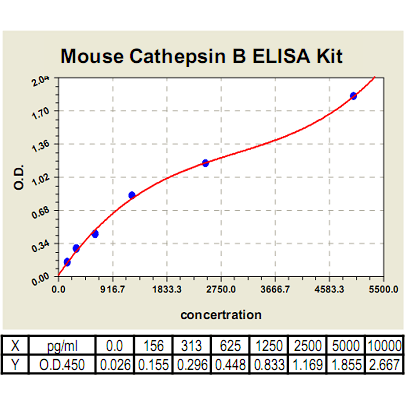Cathepsin B ELISA Kit, Mouse |
 |
BACKGROUND Cathepsin B is a papain-family cysteine protease that is normally located in lysosomes, where it is involved in the turnover of proteins and plays various roles in maintaining the normal metabolism of cells. This protease has been implicated in pathological conditions, e.g., tumor progression and arthritis. In disease conditions, increases in the expression of cathepsin B occur at both the gene and protein levels. At the gene level, the altered expression results from gene amplification, elevated transcription, use of alternative promoters and alternative splicing. These molecular changes lead to increased cathepsin B protein levels and in turn redistribution, secretion and increased activity.1 Cathepsin B is synthesized as a preproenzyme and the primary pathways for its normal trafficking to the lysosome utilize mannose 6-phosphate receptors (MPRs). Inactive procathepsin B is processed to active single and double chain forms of cathepsin B in the late endosomes and lysosomes, respectively.2 Tumor cells secrete procathepsin B and both active forms of cathepsin B. Secretion of procathepsin B occurs principally as a result of increased expression, whereas secretion of active cathepsin B seems to involve active processes that can be induced by a variety of mechanisms. Once secreted procathepsin B binds to the tumor cell surface via p11, the light chain of the annexin II heterotetramer. This binding seems to facilitate conversion of procathepsin B to its active forms. Cathepsin B and the annexin II heterotetramer colocalize in caveolae (lipid raft) fractions isolated from tumor cells. Serine proteases and matrix metalloproteinases also have been found to associate with caveolae and some with the annexin II heterotetramer. Thus, it is suggested that pericellular cathepsin B through its proximity to other proteases in caveolae participates in, perhaps even initiates, a proteolytic cascade on the tumor cell surface.3
REFERENCES
1. Sameni, M. et al: Semin. Cancer Biol. 15: 149-157, 2005
2. Hanewinkel, H. et al: J. Biol. Chem. 262:12351-6, 19873. Sloane, B.F. et al: J. Cell. Sci. 107: 373-84, 1994
Products are for research use only. They are not intended for human, animal, or diagnostic applications.
Параметры
Cat.No.: | CL0671 |
Target Protein Species: | Mouse |
Range: | 156pg/ml-10,000pg/ml |
Specificity: | No detectable cross-reactivity with any other cytokine. |
Storage: | Store at 4°C. Use within 6 months. |
ELISA Kits are based on standard sandwich enzyme-linked immunosorbent assay technology. Freshly prepared standards, samples, and solutions are recommended for best results.
Документы
Информация представлена исключительно в ознакомительных целях и ни при каких условиях не является публичной офертой








